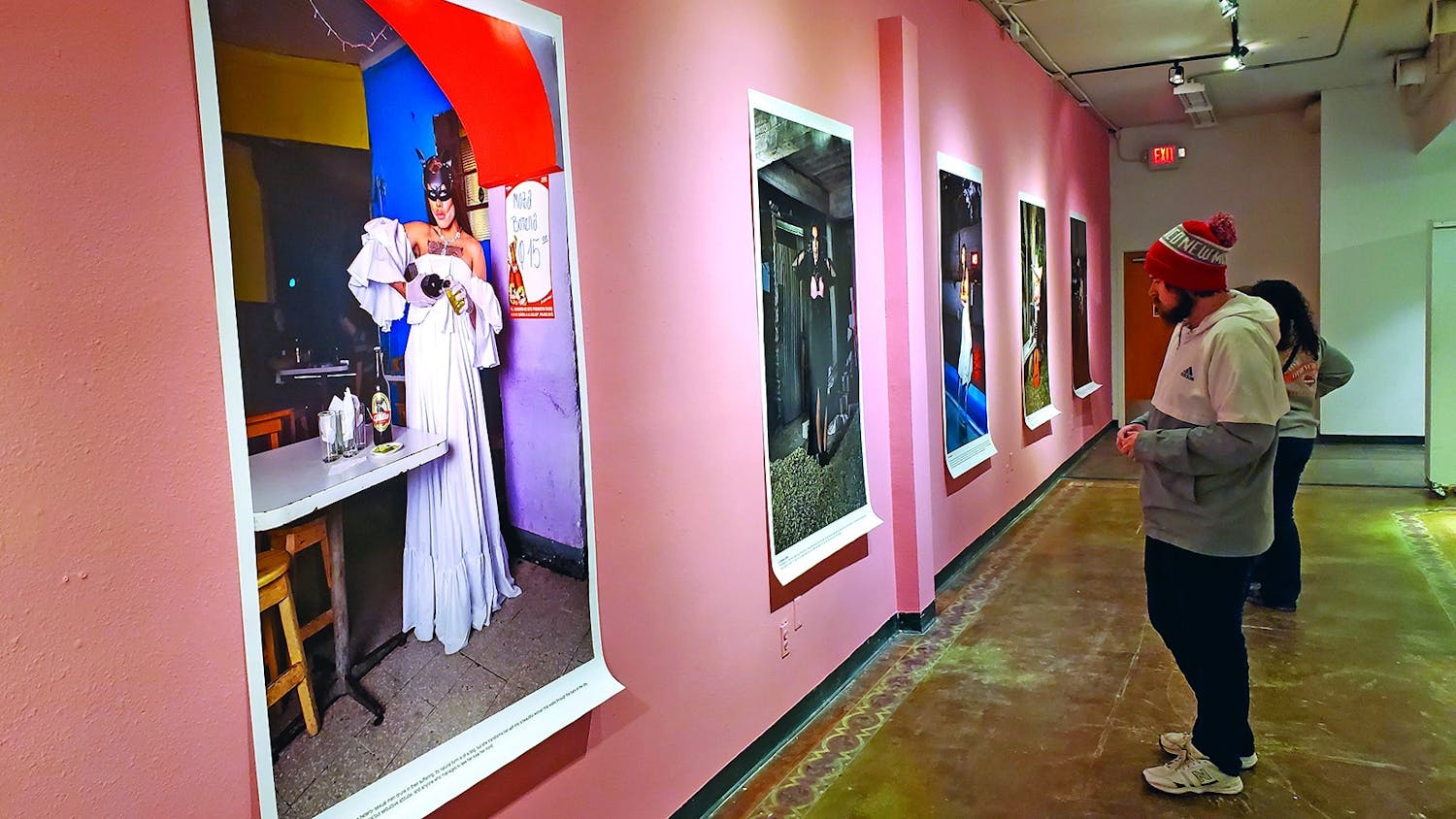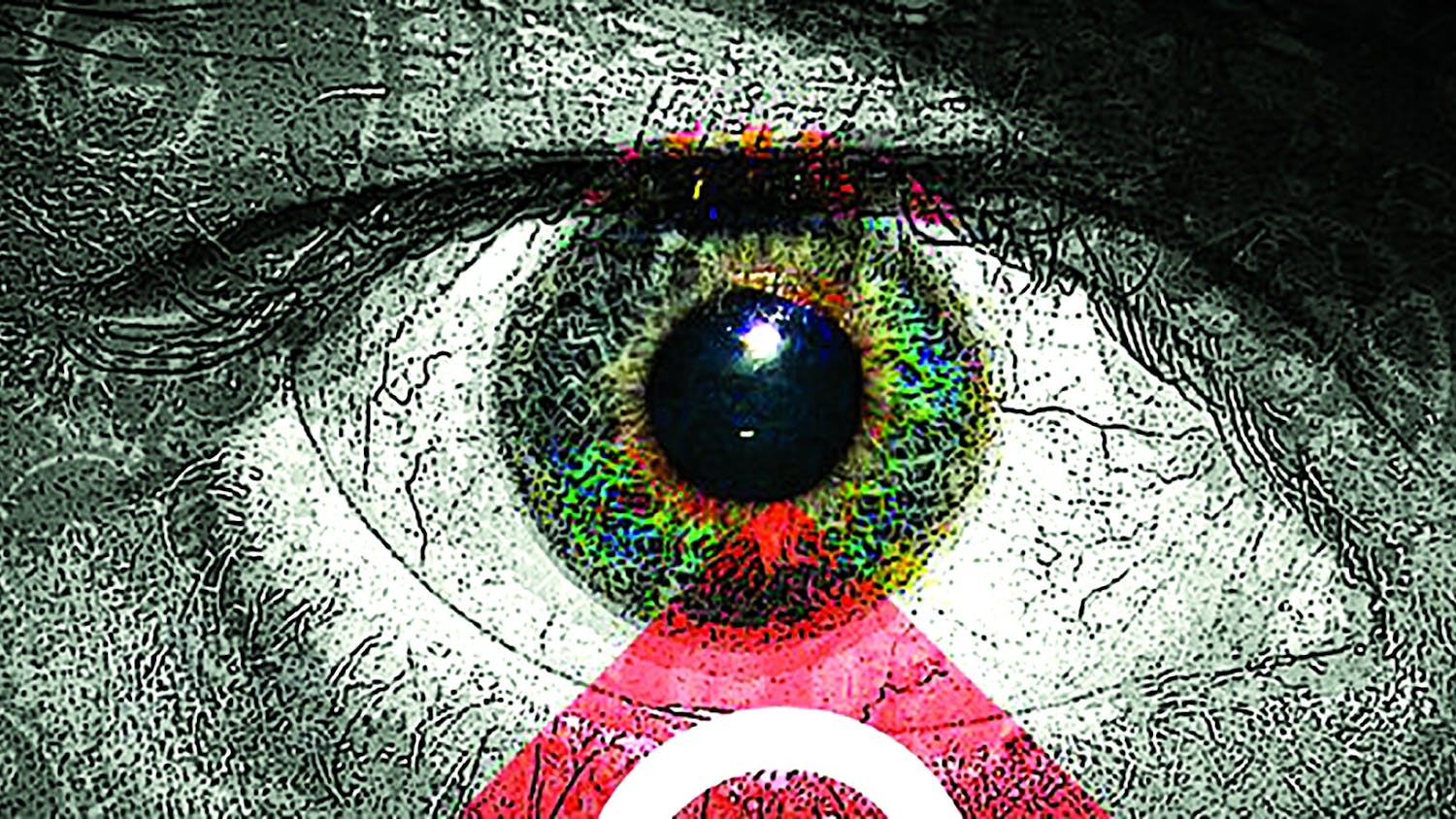Once the first domino falls in a budding Mew phase, lead singer Jonas Bjerre will quickly become the narrator of your dreams. His falsetto embeds itself beneath the skin and, viciously, the surrealist lyrics will seed your mind to bloom shortly thereafter.
And that’s just the vocals folks: this full-fledged, four-piece used to be filled out with Bo Madsen on lead, Johan Wohlert on bass and Silas Utke Graae Jørgensen on drums. They’re an experimental force of nature whom, after twenty years, have perfected the act of bludgeoning pop music over the head.
Mew’s eighth album, “Visuals,” is the best pop album of the year so far – bar none.
Which is surprising. After Madsen’s departure during the release of +- [Plus Minus] in 2015, fans found themselves in empathic turmoil. His guitar lines are staple Mew, vital in establishing the band’s early sound during A Triumph for Man days. By employing frantic and arrhythmic strums, Madsen had musicians around the world at the tips of his fingers and falling over their heels. Plus Minus is the swan song of the original lineup. Looking back, the record feels like 10,000 Days or In Rainbows of Mew’s catalog. It's a highly-refined showcase of what these Danish rascals are capable of. Overproduced and overwhelming, but it thrives in the maximalist nature. It’s rich — it’s the chocolate cake of experimental pop, so replay value is definitely diminished from, say, And the Glass Handed Kites, whose songs flow into one another. Yet, Plus Minus left some lasting damage on the indie-pop scene, enough to earn a world tour at least.
It brings me so much happiness to say that Visuals may be Mew’s best work since And the Glass Handed Kites. Even though the albums harness vastly different styles, the trio has proved themselves capable audio engineers as much as they are musicians.
Honestly, who better to produce a Mew album? They know what’s up; re-armed with a mountain of delicate moments ranging from heavy to ambient to dance to gorgeously inspiring. Bjerre’s vocal performance is sweet and agonizing simultaneously, paired with over-powerful, complex instrumentation the sonic environment spirals out of control in so many lovely directions.
Our starting point is “Nothingness and No Regrets,” an anthem so shiny and bouncy, it, unfortunately, isn’t featured on a cartoon show of some sort. It begins with the aforementioned emotional duality: you have inspiring music bolstering crestfallen lyrics. Bjerre’s poetry twirls in self-hatred yet he's enveloped in a very uplifting climate. The audience is given a chance to experience Mew evoking multiple emotions at once.
It’s satisfactory, and then the drums come in. Just two minutes in, and we see an example of a near-ideal Mew song arrangement. Explosions define the second chorus, with dense layers of beautifully mixed vocal lines communicating with one another. Bright synths fight with surprisingly clean guitar tones for control of the song, both bursting through the seams. I implore one to note how these instruments are panned here, and how Mew utilizes space in such a dense song.
“Wake of Your Life” keeps the momentum going like a skateboard in an avalanche. The pre-chorus is addicting and wraps like a vine down the nervous system. With the heavy reliance on guitar here, it feels like Madsen never left — which makes me feel bittersweet in a weird way. One-third of the song is a giant instrumental carnival, an ode to the riff’s ostinato mimicked between various instruments. It’s like eavesdropping on a really loud, poetic conversation.
Again, due to Mew’s arrangements, the listener feels rewarded as the song progresses and churns.
If you end up listening to just one track, let it be track three: “Candy Pieces All Smeared Out.” I’m in love with how heavy the riff is, such a call back to how “Circuitry of the Wolf” in how the song expands into itself. The vocals may not fit as cohesively as other cuts here, and it’s quick to see that this is by no means Mew’s best chorus. But I’ll say it again: it comes back down to arrangement. Anyone else recording these songs would have failed spectacularly – perhaps Bowie would have done it justice, but I can’t hear any other band with this level of maturity and patience in mainstream audio production.
We’re only three tracks in, folks. The next five are, as well, phenomenal. Visuals has been out for about a month now, and I’ve been listening to it almost every day, curious to see what parts seep into the temporal lobe for the long haul. It took three weeks of binging this record to nail down how each song was formatted and arranged, and I love that I had to work to understand it. Visuals is a curveball, and pop music is the batter up.
Get content from The Daily Lobo delivered to your inbox
This record is much more than the sum of its parts. I can imagine Visuals failing to have a punch live, though seeing footage of their recent Thailand show, I may be very wrong. Bear in mind, it's extremely produced, much like the Mew records before it. This isn’t some White Stripes or Black Keys set-up-two-mics-let’s-get-busy kind of situation. Bjerre thrives in overproduction, he employs at least three voices at any given time with each in charge of a different octave range that bolsters the rest of the music. His melisma hogs the spotlight, and begs you to stare at him in the eyes, with your…ears, while the rest of the band does their thing.
And they do their thing well. Pianos and synths come second to vocals, but most tracks establish an ambiance that grows into an atmosphere into, in turn, a supernova. The tracks on Visuals progress so courageously, and the melodies that lead them are so confident in doing so.
It’s an evocative experience. “Twist Quest” for example: when they released it as a single earlier in 2017, it took me a few good listens to truly appreciate its nature. But it will lock itself away in your head and strike throughout the day, in how ferocious that hook is. Like most tracks here, it relies purely on genuine, emotional conveyance — it may fall flat, depending on your taste in music. But just wait until the saxophone sails in after the second chorus.
Yet, so it goes, some songs lose their replay value. I found “Ay Ay Ay” gets hard to digest after a while and employs a very weak chorus. It’s one of the only songs on the record that doesn’t evolve into something bigger, which could have been interesting if they designed the track around that parameter. Furthermore, Visuals ends on a very weak note with the tracks “Zanzibar” and “Carry Me to Safety.” Both are lackluster and, besides a cool tremolo and chant section, don't even stand close to previous album closers.
Real talk. I thought Mew was onto something by now with how they close out albums.
- Frengers (2006) ends with “Comforting Sounds,” debatably the most Mew-sounding Mew song in the catalog. Again, because of the progression. “Comforting Sounds” is born, lives, graduates, gets married, has kids and dies in eight minutes — it’s tear-jerking, depending on what mood you’re in. The climax is a journey to achieve, but patiently blossoms into a garden of lucid emotion that grips listeners in a hurricane of pure feeling.
- And the Glass Handed Kites ends with “Louise, Lousia” — a terribly heartbreaking cut that provides a violent amount of perspective to the album that comes before it. The narrator is struggling with a multitude of voices throughout the record, conveyed by radically different singing styles (compare “Apocalypso” with “The Zookeeper’s Boy”) and a healthy number of instrumental tracks “Circuitry of the Wolf” and “Small Ambulances,” “…Lousia” ends so sorrowfully that I enjoy reaching that point, just to imagine the pain.
- The penultimate track on Plus Minus is “Rows,” a very odd tune, even for Mew, but still ties all the loose ends together. It’s a ten-minute trek that may take a substantial number of listens to get into, however, I find it really evokes how the unstable relationship of the band at that time – it was right when Madsen was about to leave. It’s wonky and shy but still, radiates before the curtain close.
Visuals runs headfirst into the wall in this department. However, this is my only true complaint with it.
I can see if people dislike this album. If you’re not a Mew fan you may write Visuals off as too emotional, or too reliant on melodic gimmicks. Perhaps it may not be the best jumping-off point, but then again… what Mew record is? It’s innovative, but there may be compromises you have to make.
Bjerre’s vocals, for example. You can’t ignore them, and if you dislike them, it may jeopardize your whole experience of consumption. Personally, I’m infatuated with male singers that utilize the vocal ranges of women (like, sincerely: Claudio Sanchez and Brian Aubert come to mind).
Visuals is a very different record and that’s what pop music deserves right now. These dudes are the bat-men of indie pop, and by throwing grenades of catchy songwriting and dense production, they prove it on almost every track. I can’t wait to hear what Mew have next in store, and having bought tickets to their Denver show in August, I couldn’t be prouder to be a fan of the group.
Audrin Baghaie is the music editor for the Daily Lobo. He can be reached at music@dailylobo.com.






